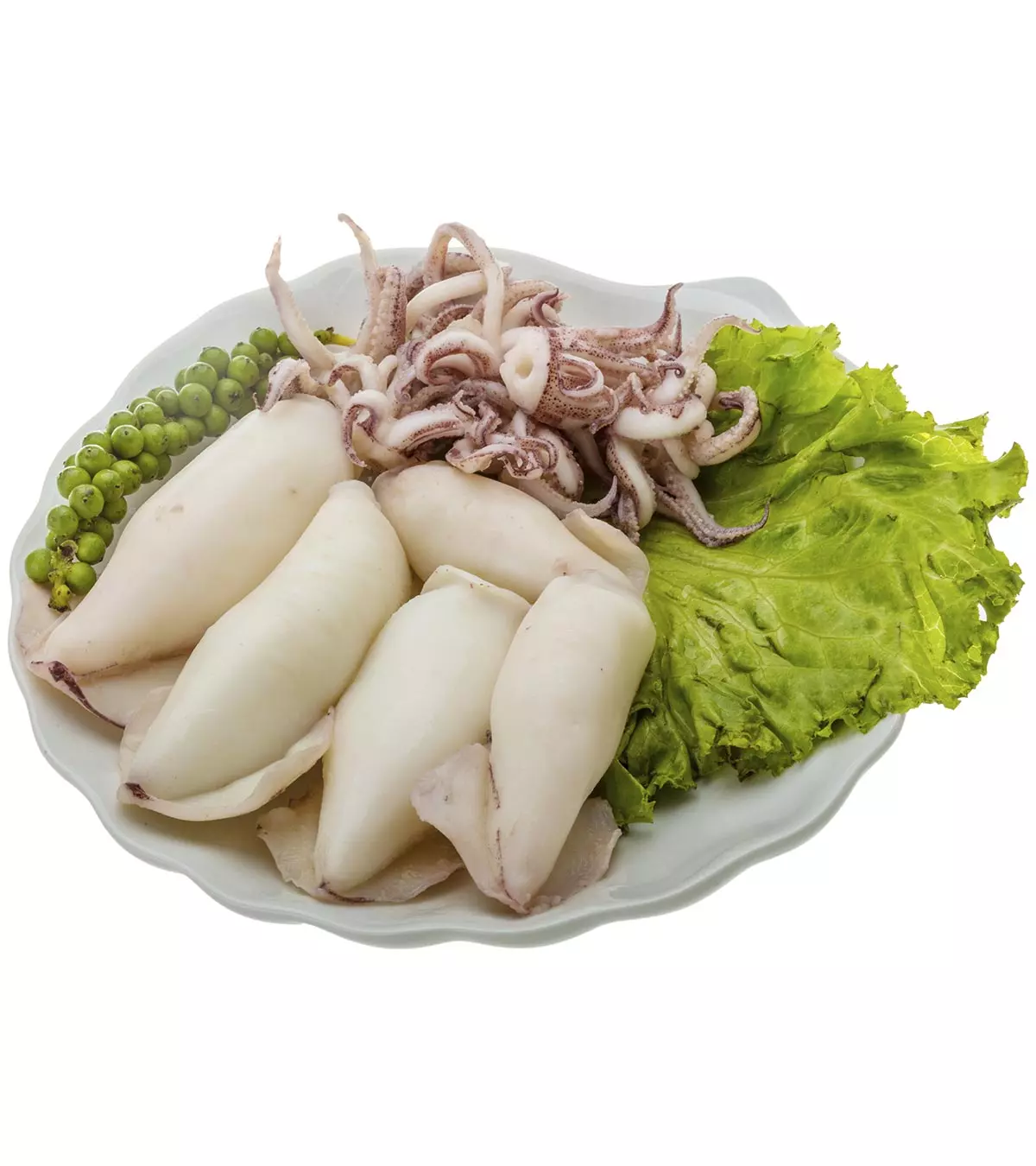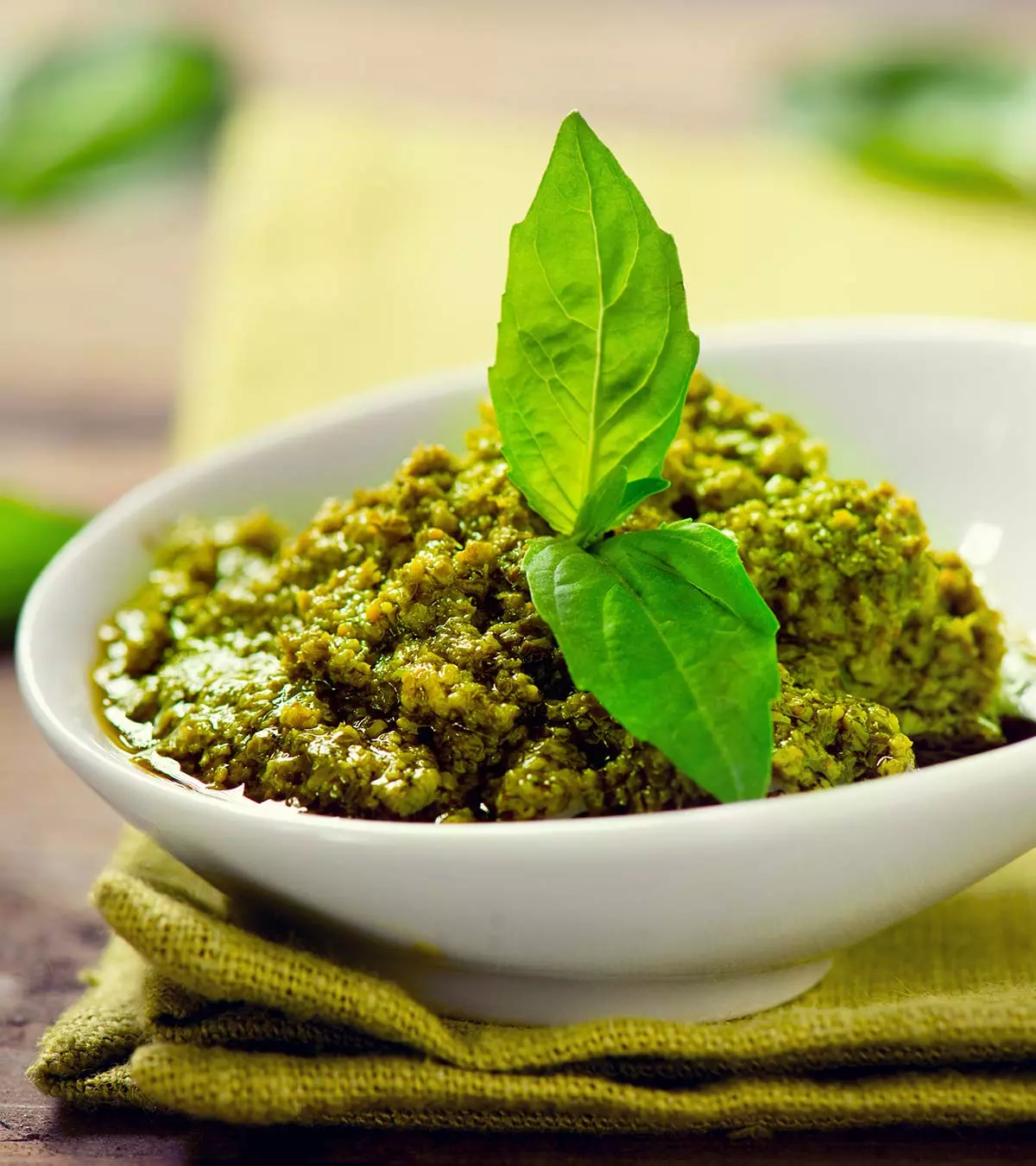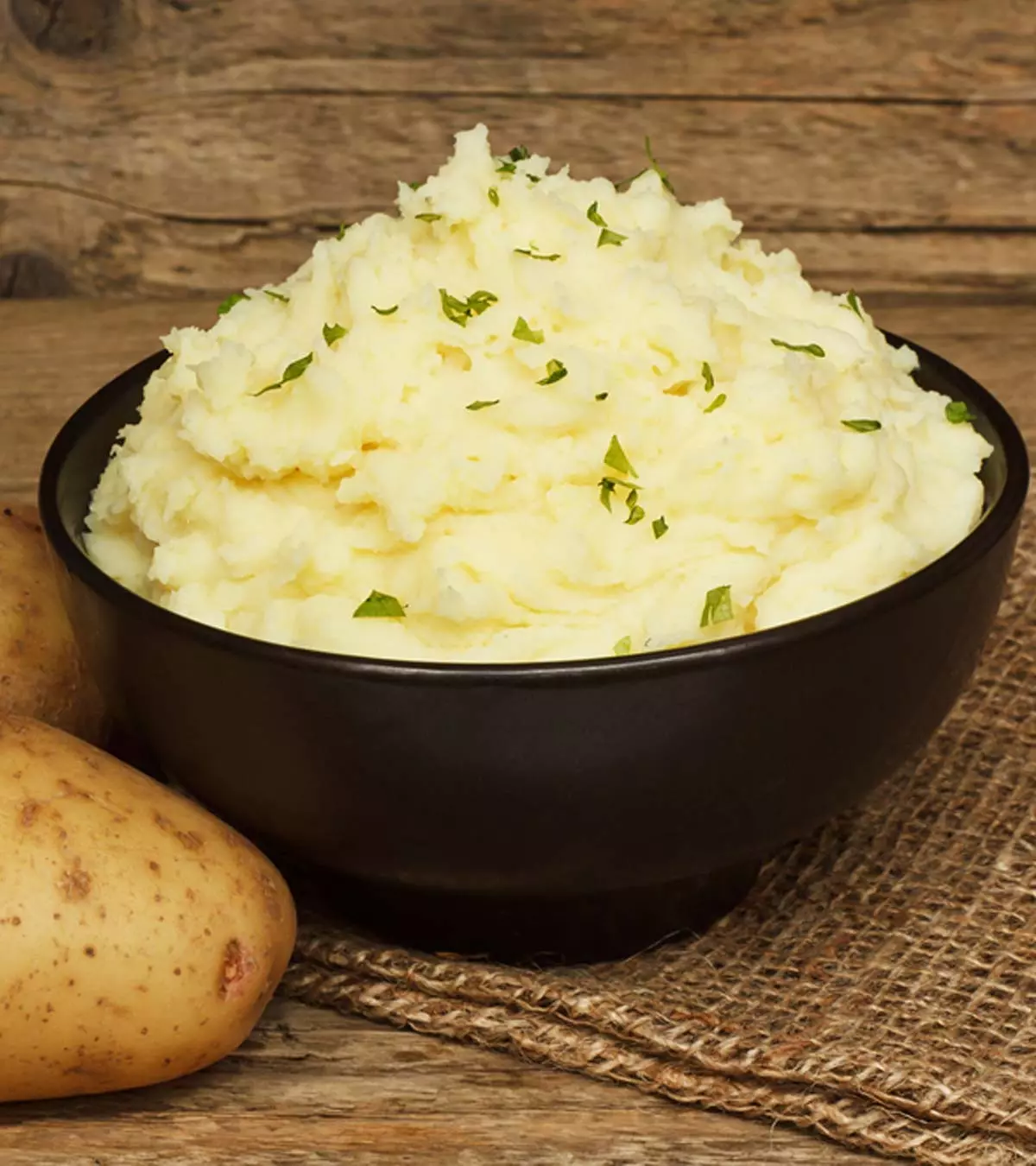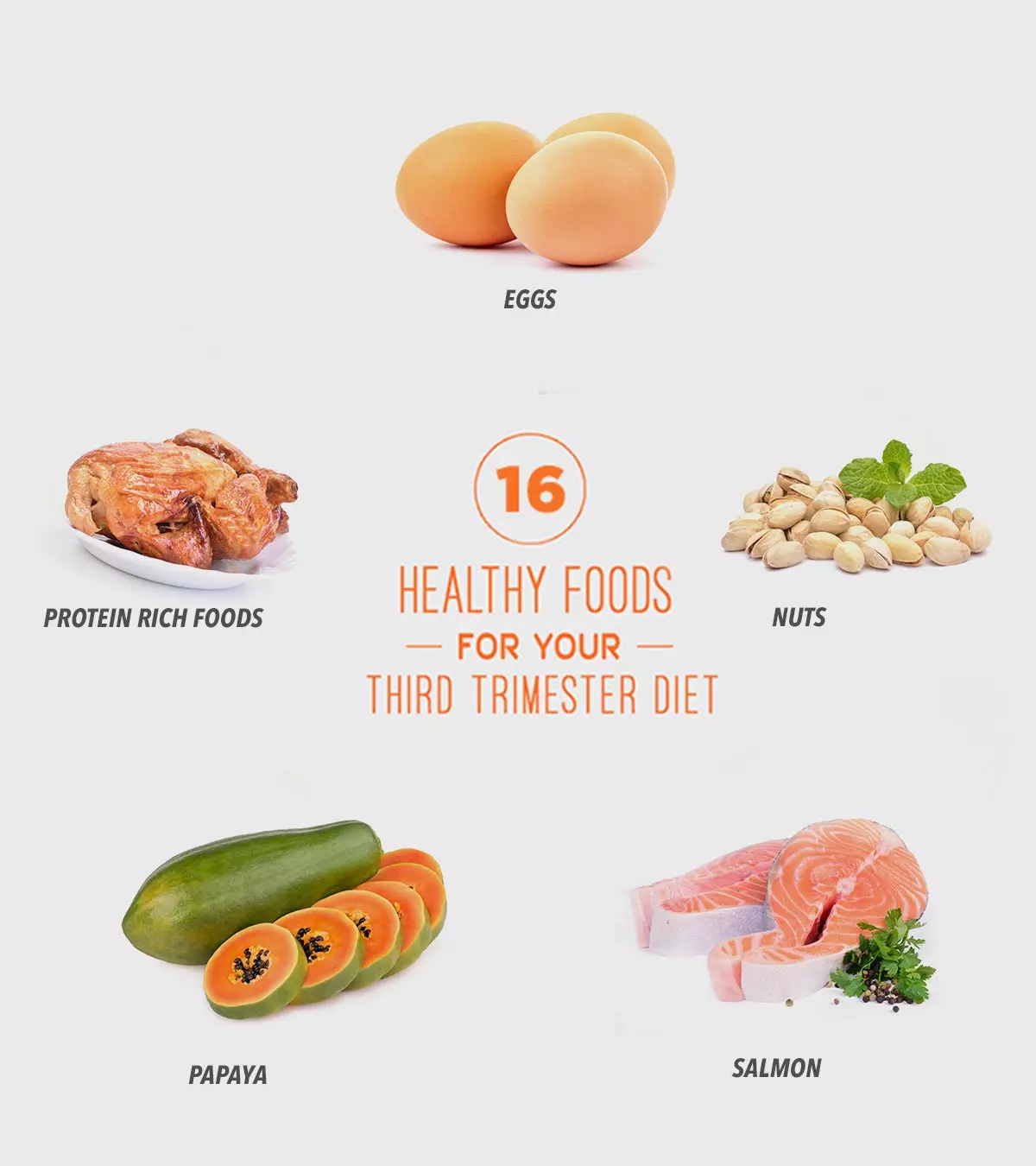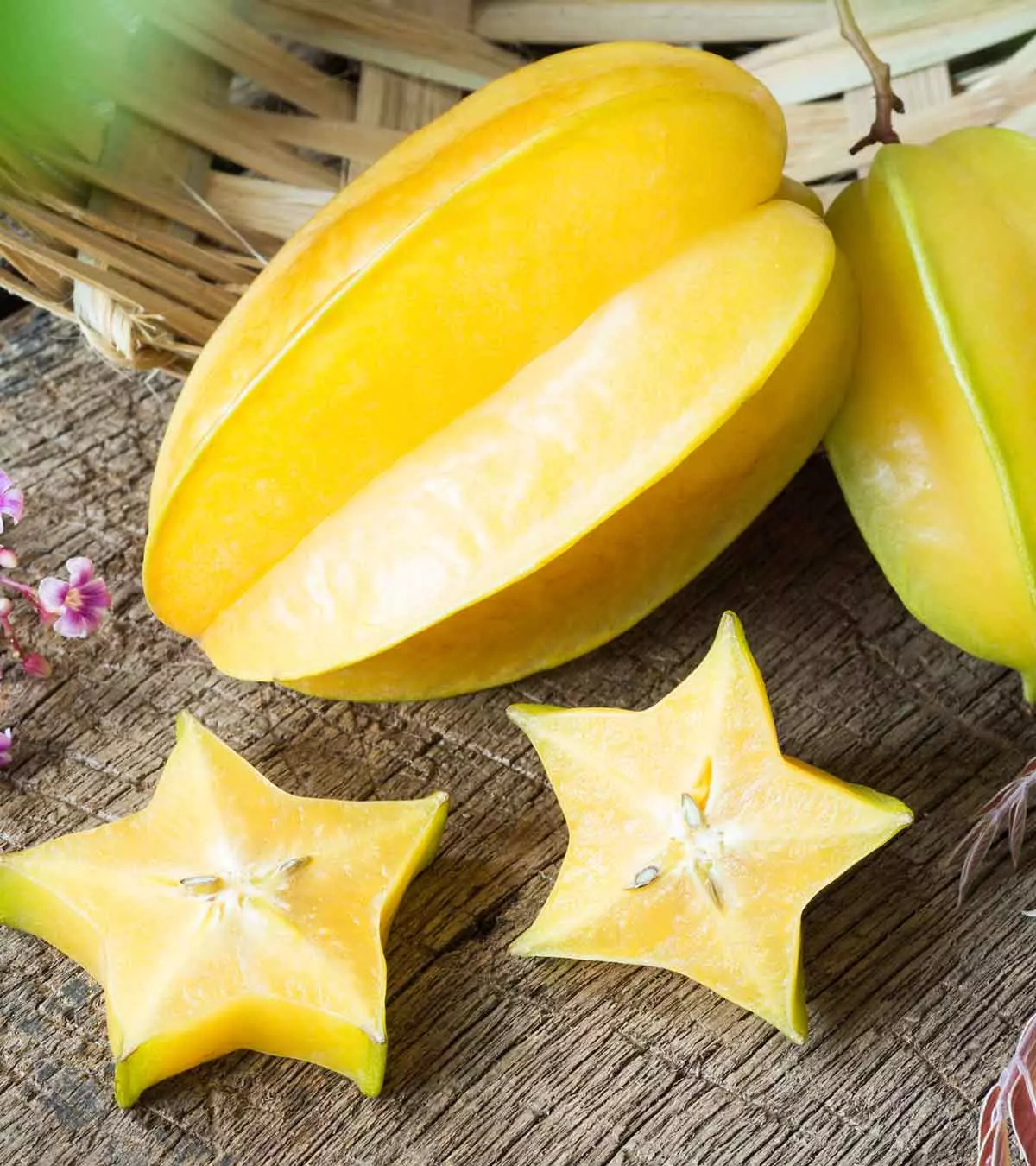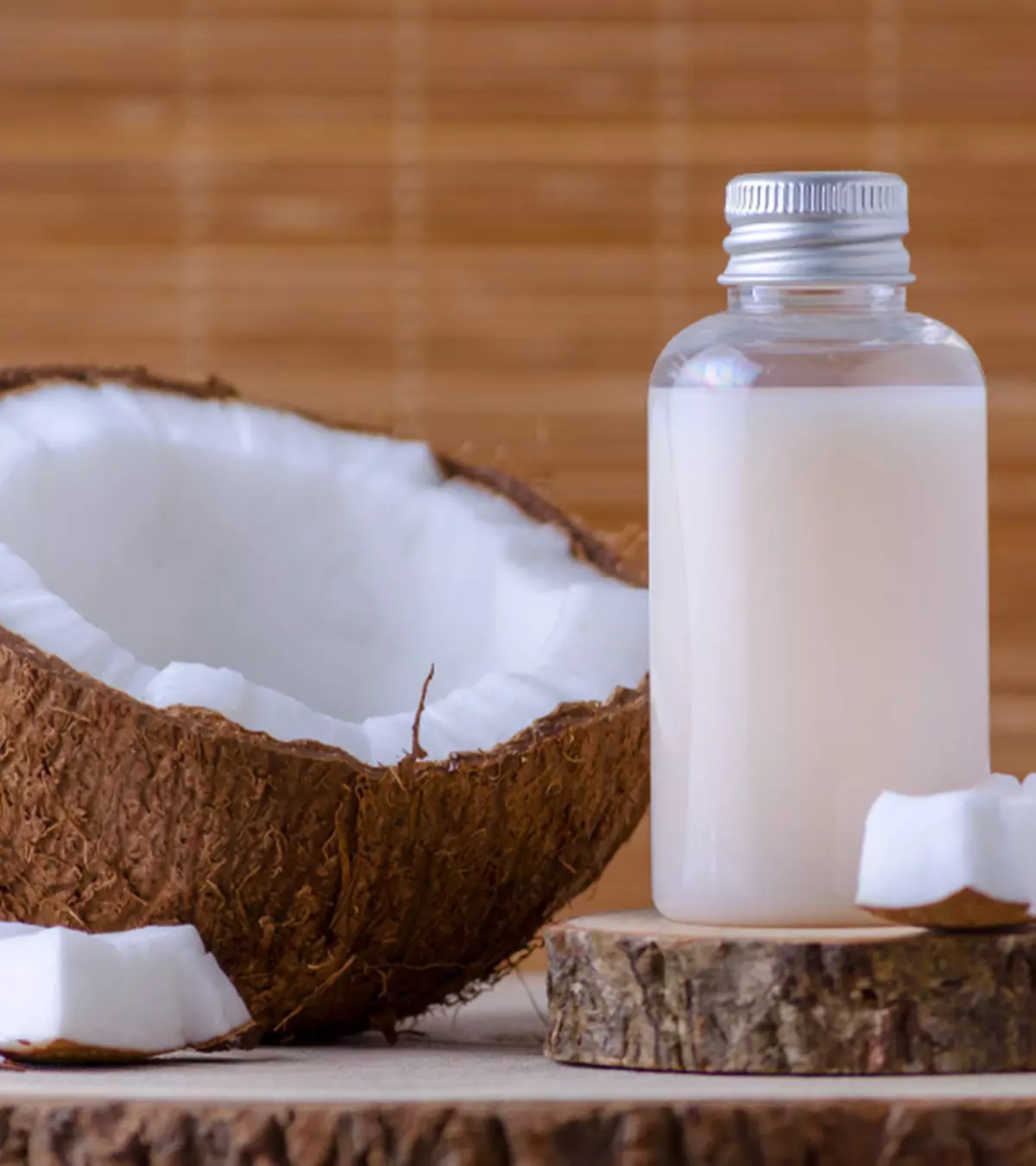
Image: ShutterStock
Many parents have been exploring the nutritional benefits of coconut milk for babies since it is a popular plant-based milk alternative. Of course, substituting coconut milk for breast milk or infant formula is a no-go. However, you may add a little coconut milk to the weaning baby’s or toddler’s diet. Coconut milk is obtained from mature coconut pulp. Its peculiar taste and creamy texture make it a common choice in savory and sweet recipes. Although it cannot substitute breastmilk, it has nutritional and therapeutic properties. Therefore, it is best to opt for fresh coconut milk prepared at home rather than canned coconut milk. Read on to know the benefits of coconut milk and some interesting recipes with coconut milk for babies and toddlers.

Key Pointers
- Babies older than 6 months may occasionally consume coconut milk-based products.
- Coconut milk is nutritious and also available fortified with calcium and vitamins.
- Make sure you buy packaged coconut milk from a reputable and trusted brand and keep the intake occasional for babies.
- Check out coconut milk puree, creamy lentil veggie curry, and other recipes to enhance the nutritional value of your baby’s diet.
When Can You Introduce Coconut Milk To Your Infant?
Babies older than 12 months may have calcium-fortified coconut milk as the main drink. If you wish to introduce coconut milk sooner, adding it to the baby’s weaning food is suitable (1). You could try coconut milk-based cheese, yogurt and desserts for babies older than six months occasionally (2). In any case, consult a pediatrician before giving coconut milk to the baby.
Nutritional Value Of Coconut Milk
The nutritional composition and qualities of coconut milk vary depending on the quality of coconut pulp. Generally, organic coconut milk does not contain much calcium and vitamin D. However, it is recommended that milk alternatives for children should contain at least 120 mg of calcium per 100ml (1). Hence, coconut milk, sold as a dairy alternative, is often fortified with nutrients such as calcium and vitamin D (3).
One fluid ounce (30.5g) of coconut milk fortified with calcium, vitamins A, B12, and D offers the following nutrients (4) (5).
| Nutrients | Amount | RDA (12-36months) |
|---|---|---|
| Water | 28.8g | – |
| Energy | 9.46kcal | – |
| Protein | 0.064g | – |
| Total lipid (fat) | 0.634g | – |
| Carbohydrate, by difference | 0.891g | – |
| Calcium, Ca | 57.3mg | 500mg |
| Potassium, K | 5.8mg | 1000mg |
| Sodium, Na | 5.8mg | 225mg |
| Vitamin A | 63µg | 400µg |
| Vitamin B12 | 0.63µg | 0.7µg |
| Vitamin D | 1µg | 10µg |
Sources: US Department of Agriculture and World Health Organization
Coconut milk is frequently viewed as a lactose-free option for infants who are intolerant to lactose. However, whether to use coconut milk for a baby is a decision you need to make with a pediatrician. Some other dairy-free alternatives are soy milk, rice milk, oats milk, almond milk, and hemp milk. It is worth noting that vegan milk, including coconut milk, is becoming increasingly popular as a nutritious and sustainable alternative to traditional cow’s milk.
Possible Health Benefits Of Coconut Milk For Babies
Coconut milk has nutritional elements, such as medium-chain triglycerides and bioactive compounds that could benefit health over time (6) (7):
Below are some notable benefits of coconut milk that a baby may reap.
- Offers nutrients: Coconut milk is calorie-rich, has high amounts of saturated fat and minerals (8). This nutritional profile could make it a good choice for babies who need these nutrients to maintain their rapid growth and development. The nourishment provided by coconut milk is beneficial for the overall health and well-being of babies.
- Improves digestion: Coconut milk is considered to improve digestion and alleviate baby’s constipation through its high water content and bioactive compounds (9). However, clinical evidence to support this theory is limited.
Lauren Mahesri, nutritionist and dietitian from Houston, Texas opines, “Coconut milk does not act as a laxative for a baby. However, its high water, electrolyte, and fat content can aid digestion. I would not recommend using coconut milk to treat chronic constipation, but it is part of a gut-healthy diet.”
- Strengthens immunity: The nutritional components of coconut milk could stimulate the immune system (10). Also, it contains bioactive compounds possessing antioxidant properties. The medium-chain triglycerides (MCTs), such as lauric acid, present in coconut milk, may help fight infections and illnesses (11).
- Supports brain development: Research shows that coconut milk contains considerable amounts of saturated fatty acid (10). These fatty acids may support the baby’s healthy brain development in the long run.
- Suits those with lactose intolerance: Another benefit of coconut milk is that it is free from lactose, making it a good alternative to cow’s milk. It can also be good for those with cow’s milk allergy (3).
Besides these, coconut milk may also reduce inflammation and promote heart health over time.
Possible Side Effects Of Coconut Milk For Babies
Although coconut milk offers certain benefits, its use among babies is not promoted. Here are some side effects of coconut milk you should be aware of:
- One cup of coconut milk provides 0.51g of protein, which is significantly lower than whole cow milk, which contains 7.69g of protein (12).
- Also, coconut milk is high in saturated fat (4), which may fill your baby’s little tummy and suppress their appetite for breastfeeding, formula milk, and other foods. It is a good idea to keep saturated fat intake to a minimum. Otherwise, excess intake of saturated fatty acids may increase the likelihood of developing atherosclerosis in young children (21).
- Commercial coconut milk, usually sold as a milk substitute, is often diluted and may contain artificial sweeteners and thickeners (10). These compounds may not be good for the baby’s health, and parents might want to avoid them.
- Coconut is also a potential skin allergen, though food allergy associated with coconut milk consumption is not as common (22).
- The predominant inclusion of plant-based milk, such as coconut milk, can also put your baby at risk for major nutritional gaps. Plant-based milks have a low content of several essential nutrients, including protein, calcium, and vitamins, required for a baby’s growth and development (10).
- It can also increase the risk of developing KwashiorkoriA type of malnutrition due to severe protein deficiency, resulting in swelling and skinniness in young children if included as a primary drink (10) (23).
Note: If you wish to use coconut milk for cooking, use canned coconut milk specifically made for cooking purposes.
Precautions To Take While Using Coconut Milk For Babies
Here are some precautions to observe while using coconut milk for babies.
- Prefer to buy packaged coconut milk from a reputable and trusted brand. Look for no-sugar options fortified with essential nutrients, such as calcium and vitamin D.
 Point to consider
Point to consider- Never feed coconut milk to infants, nor give it to older babies as an exclusive drink (3). If you’re from a vegan family, make sure to incorporate other foods rich in calcium, protein, and vitamin D in your baby’s diet.
- Introduce coconut milk as a part of other foods, such as mash, puree, or porridge. Keep the intake occasional as its protein and calcium content is not enough. Being rich in calories and fats, it can keep your baby full for longer and suppress its appetite.
- Begin by feeding a teaspoon of coconut milk as a part of food preparation and gradually increase the intake to a tablespoon and then to two.
- After ingesting coconut milk, if the baby experiences discomfort or shows signs of sensitivity or intolerance, discontinue feeding, and try later.
- Allergy after eating coconut is rare, but the allergic reaction after touching coconut, called contact dermatitis, is relatively common (13). If the baby has an existing dermatitis condition or a family history of skin allergies, consult a doctor before introducing coconut milk.
- Cross-reactivity of coconut with walnut and hazelnut has been reported. Most individuals with a tree nut allergy can eat coconut and its products (14). Nevertheless, if your baby has nut or other food allergies, consult a doctor before introducing coconut milk.
- Serve coconut milk as a drink to toddlers occasionally. Plain coconut milk, coconut milkshakes, and coconut milk smoothies are some options to try.
- Keep the intake of coconut milk occasional, even for older toddlers. Toddlers older than two years should consume low-fat foods for effective weight management and optimum heart health (15).
How To Make Coconut Milk At Home
Making coconut milk at home is easy and economical. Since you have control of ingredients, milk is free from additives, fillers, and preservatives. Here are simple steps you can follow to make fresh coconut milk at home:
- Crack open a coconut and collect water in a separate bowl.
- Separate the coconut flesh from the shell using a knife or scraper.
- Cut the coconut into small pieces so they are easier to blend.
- Blend the coconut flesh and water into a lump-free, smooth fluid.
- Strain the fluid into a deep bowl using a muslin cloth or fine mesh strainer.
- Store this homemade coconut milk in an air-tight container in the refrigerator and use it as required.
You can use homemade coconut milk to prepare healthy baby foods like smoothies, gravies, porridge, and milkshakes. After consulting a pediatrician, it can be used as a substitute for dairy milk for toddlers.
 Quick tip
Quick tipHealthy Coconut Milk Recipes For Babies And Toddlers
Below are some easy-to-prepare, healthy baby food recipes that incorporate coconut milk to boost your little one’s diet.
1. Coconut milk puree (6 months+)

You will need:
- ¼ cup mango puree
- ¼ banana puree
- ½tsp dry fruit powder
- 2tbsp homemade coconut milk
How to prepare:
- Mix all the ingredients in a mixing bowl thoroughly. Ensure no lumps are present.
- Transfer some amount to a feeding bowl and feed the baby. Store the remaining amount in an airtight container in the refrigerator for no more than two days.
2. Creamy lentil veggie curry (8 months+)

You will need:
- 50g red lentil (cooked)
- ½ cup corn kernels
- ½ carrot (peeled and finely chopped)
- ½ capsicum (finely chopped)
- 1 small onion(finely chopped)
- ½ cup homemade coconut milk
- 1½ cup water
- 2tbsp olive oil
How to prepare:
- Heat the oil in a frying pan over low heat. Add onions and fry them until they turn golden brown.
- Stir in the lentil, corn kernels, carrot, and capsicum. Cook for five minutes until the veggies turn soft.
- Add water and coconut milk to the mixture and bring to boil over medium heat.
- Lower the flame, cover the pan, and simmer the mixture for 15 to 20 minutes.
- When the lentils are soft, turn off the heat and set the pan aside to cool. The curry is ready.
- Mash or blend to appropriate texture before feeding it to the baby.
 Quick tip
Quick tip3. Sago and coconut milk porridge (10 months+)
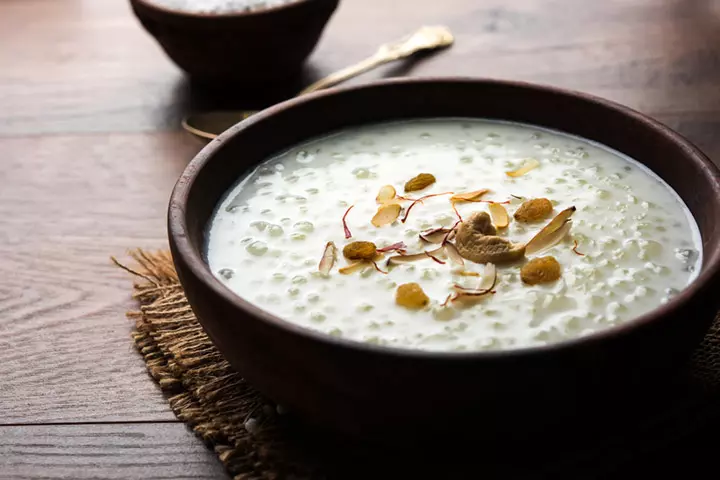
You will need:
- ¼ cup sago (washed, drained, and soaked)
- 1 cup coconut milk
- 1cup water
- 1tsp dry fruit powder
- ⅛ tsp cardamom powder
How to prepare:
- Boil coconut milk and water mix in a saucepan over low heat.
- Add cardamom powder, dry fruit powder, and sago. Cook for seven to eight minutes while stirring occasionally. Ensure no lumps are present.
- As the milk boils, it will thicken. Add more water to adjust the porridge’s consistency.
- Once the mixture thickens as desired, turn off the flame, and set the porridge aside to cool. Pour some porridge into a feeding bowl and feed.
4. Banana and coconut milk smoothie (12 months+)
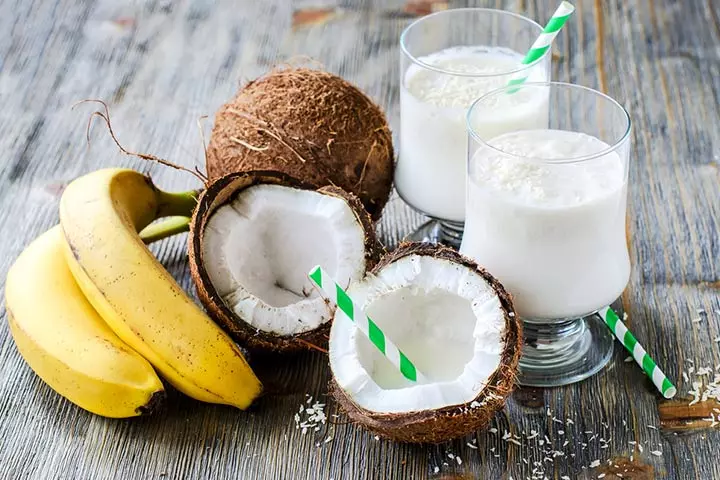
You will need:
- 1 cup coconut milk
- 1 mashed banana
- ½tsp jaggery
- 1tsp dry fruit powder
How to prepare:
- Blend all the ingredients into a smooth-flowing smoothie in a blender. Ensure no lumps are present.
- Pour the smoothie into a serving glass and serve.
- You can add more seasonal fruits, such as mango, peach, berries, and pineapple for babies.
5. Coconut milk oats with banana (10 months+)
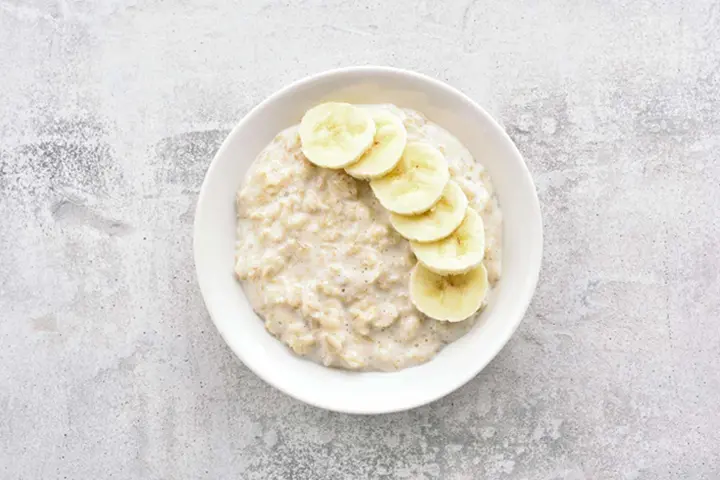
You will need:
- 1tbsp finely ground rolled oats
- 2tbsp coconut milk
- 1 ripe banana, mashed
- A pinch of cinnamon
How to prepare:
- Combine the rolled oats and coconut milk in a blender.
- Add the mashed banana and mix until you get a soft and creamy consistency.
- Add a bit more coconut milk if you prefer a thinner consistency.
- Garnish with a pinch of cinnamon and serve to your baby.
Some other ways you can try to include coconut milk in your baby’s food are:
- Mix coconut milk into pureed foods
- Add in oatmeals and porridge recipes
- Add in soups for older babies to form a creamy base
- Blend it with boiled and mashed fruits and vegetables
- Include it in baby-friendly pancakes and muffins
 Quick tip
Quick tipFrequently Asked Questions
1. Which is healthier for my baby, coconut or almond milk?
Babies under the age of 1 year are suggested not to drink almond milk (16). Coconut milk-based food, on the other hand, can be recommended to babies along with other foods after the baby reaches six months of age (2). However, consult a specialist before including them in the diet, as they are considered food allergens.
2. Can coconut milk hurt the stomach of my baby?
Coconut milk may hurt a baby’s stomach due to saturated fat content that may cause trouble with digestion (17). Therefore, it is important to introduce coconut milk carefully and age-appropriately by mixing it with suitable foods and avoiding choking hazards.
3. Is it better to give my infant coconut water or coconut milk?
Coconut milk contains more protein, provides more energy than coconut water, and can benefit your growing baby. However, coconut water is rich in minerals such as sodium, potassium, and calcium and can help replenish the electrolytes and support bone growth (18) (19). Coconut water for babies is a natural option as it is found inside the fruit, while coconut milk may often be processed. Although both beverages offer certain benefits, they must be fed to infants in moderation along with other more preferable sources of nutrition, such as cow’s milk, after consulting with a pediatrician (20) (3).
Coconut milk for babies is an energy-dense beverage that they can consume along with other weaning foods. Feeding coconut milk to babies under 12 months is strongly discouraged. However, toddlers can consume a cup of coconut milk as their main drink or as a part of other foods such as soups, curries, porridge, and cakes. But never replace whole cow’s milk or breast milk with coconut milk since it lacks certain essential nutrients that babies and toddlers need for proper growth and development. Instead, include coconut milk in moderation as a part of a balanced diet to enjoy its benefits.
Infographic: Nutritional Benefits Of Coconut Milk
Coconut milk is extracted from mature coconut kernels. It is a source of various nutrients such as proteins, fats, and carbohydrates. These nutrients may effectively support your baby’s overall growth if used properly. The infographic below summarizes the potential health benefits of coconut milk for babies and its safety aspects.
Some thing wrong with infographic shortcode. please verify shortcode syntax
Illustration: Coconut Milk For Babies: Right Age Benefits And Precautions

Image: Stable Diffusion/MomJunction Design Team
Immerse yourself in the process of preparing fresh and luscious coconut milk for your little ones with this user-friendly tutorial—a nourishing choice for early foods and healthy snacking.
References
1. Milk free diet for babies; NHS
2. Cow’s Milk Free Diet for Infants and Children; NHS
3. PLANT-BASED MILKS: COCONUT; University of Florida
4. Coconut milk, FDC ID: 1097553; Fooddata Central; USDA
5. Feeding and nutrition of infants and young children; WHO
6. Kokilavani et al.; Identification of Volatile Compound in Coconut Milk Samples Using GC-MS; International Journal Of Current Microbiology Applied Sciences
7. Asiri N. Karunasiri et al.; Antioxidant and Nutritional Properties of Domestic and Commercial Coconut Milk Preparations; NCBI
8. Victor Ephraim Edem et al.; Optimization of Coconut (Cocosnucifera) Milk Extraction Using Response Surface Methodology; International Journal of Nutrition and Food Sciences
9. The Benefits of Coconut Milk; Jamaica Hospital Medical Center
10. Elvira Verduci, et al.; Cow’s Milk Substitutes for Children: Nutritional Aspects of Milk from Different Mammalian Species, Special Formula and Plant-Based Beverages; NCBI
11. Saif Alyaqoubi et al.; Study of antioxidant activity and physicochemical properties of coconut milk (Patisantan) in Malaysia; Journal of Chemical and Pharmaceutical Research
12. Cow’s Milk Alternatives: Parent FAQs; AAP
13. Coconut Allergy; Australian Society Of Clinical Immunology And Allergy
14. Coconut Allergy; Anaphylaxis Campaign
15. Dietary fat and children; Medline Plus; US National Library Of Medicine
16. Dairy and alternatives in your diet; NHS
17. Caring for Children; NSW Ministry of Health
18. Nuts, coconut milk, raw; U.S. Department of Agriculture
19. Nuts, coconut water; U.S. Department of Agriculture
20. Healthy Beverage Consumption in Early Childhood; Healthy Drinks Healthy Kids
21. Richard L. Fowler; Filled Milks, Coconut Oil, and Atherosclerosis; Pediatrics
22. Lacey Kruse et al.; Coconut allergy; Annals of Allergy, Asthma & Immunology
23. sidro Vitoria; The nutritional limitations of plant-based beverages in infancy and childhood; Nutrición Hospitalaria
Community Experiences
Join the conversation and become a part of our nurturing community! Share your stories, experiences, and insights to connect with fellow parents.
Read full bio of Seeemaa Budhraja
- Lauren Mahesri is a registered dietitian and the founder of The Pediatric Dietitian. She did her education at The University of Texas at Austin and has more than three years of experience in the field.
 Lauren Mahesri is a registered dietitian and the founder of The Pediatric Dietitian. She did her education at The University of Texas at Austin and has more than three years of experience in the field.
Lauren Mahesri is a registered dietitian and the founder of The Pediatric Dietitian. She did her education at The University of Texas at Austin and has more than three years of experience in the field.
Read full bio of Swati Patwal
Read full bio of Rohit Garoo
Read full bio of Ghazia Shah






